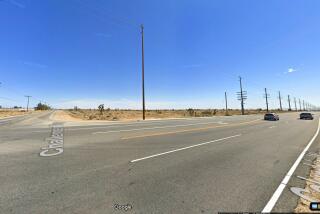Crash Course : What to Do When You Lock More Than Horns on Freeway
For all the smashups, crackups and pileups that occur daily on North County’s freeway system, many people don’t know what to do or what they can do if they’ve been involved in an accident. Here are some basics:
What should you do if you get in an accident on the freeway?
If you are not injured and your car is driveable, move your car from the traffic lanes and onto the right shoulder or an off-ramp, if possible. If your car still has electrical power, put on your hazard lights.
If your vehicle is inoperable, making the accident scene as safe and visible as possible is the top priority, said John Marinez, a California Highway Patrol spokesman.
Setting out a flare pattern to divert traffic away from the accident scene is helpful. Flares that can be carried in your trunk can be purchased at an auto parts store for a little more than $1 a stick.
Who responds to traffic accidents in North County?
The California Highway Patrol responds to all accidents, injury and non-injury, on the freeway system and unincorporated roadways. It also responds to accidents on some streets within city limits that have not been annexed.
The CHP should be called under almost every condition, said Officer Phil Konstantin, an agency spokesman. Even if the two parties agree to handle the damages themselves, legal and medical ramifications could develop, he said.
“Sometimes people change their minds if they were at fault or if they don’t want to do anything about it. It’s hard to reconstruct an accident after all the parties have dispersed. That’s the best time to determine what happened,” Konstantin said.
How is CHP notified of an accident?
The CHP gets most of its accident calls from people who are not involved in the accident, Marinez said. Passing motorists or witnesses to an accident use public pay phones or cellular car phones to alert authorities. Freeway call boxes are used, but not as frequently.
The call boxes, situated at half-mile intervals along the freeways, give you a direct line to the CHP.
If you’ve been in an accident and can’t get to a freeway call box, try flagging down another motorist and get him to call the CHP, Marinez suggested.
What if there are injuries?
Emergency medical personnel respond by jurisdiction. A CHP dispatcher, using a computer network, determines the nearest and most appropriate emergency agency to respond to an injury accident.
Paramedics or other emergency personnel will take the injured to the closest trauma center or hospital.
Life Flight, the emergency helicopter, responds to calls throughout the county.
Is there anything else you can do before help arrives?
Exchanging names, driver’s license numbers, registration and insurance information before the CHP arrives is a time saver, Marinez said. Once the officers arrive, they will collect statements and reconstruct the accident.
However, the freeway is not the place to determine who’s fault the accident was, Marinez said. That decision is made after the officer has filed his report.
“We could create unnecessary problems at the scene of the accident if we tried to determine fault right then,” Marinez said. “Officers are there to conduct an investigation, get statements and follow up at any medical facilities if necessary.”
What happens to your car after an accident? What happens to you?
The CHP has contracts with several tow truck companies in the county and uses them on a rotating basis. As part of their contract, these companies are required to have storage space for your vehicle. However, you decide whether you want your car to go into storage or be taken to a body shop or home.
If you do not require medical attention, you probably will get a ride with the tow truck operator. Occasionally, the CHP officer will drive you home.
Who cleans up the aftermath?
The tow truck company removes broken glass and small vehicle parts, Marinez said. Cleanup crews from the California Department of Transportation are occasionally called in, too.
Caltrans is also called out when something on the freeway requires repair, such as a broken guardrail.
What if you witness an accident?
Witnesses are not required by law to stay at the scene of an accident if they were not involved. Even when uninvolved motorists choose to stop and assist accident victims, they do not have to supply information to the CHP officer for the report.
However, whether you stop or continue on, you could be subpoenaed as a witness by one of the parties involved in the accident.
What if you are involved in a hit-and-run accident?
Whenever you are involved in an accident, you are required by law to stop and exchange information with the other person. If the other person has been injured, you are also required to render assistance, Konstantin said.
“If you exchange information then leave and that person dies on the side of the road, it comes under the general concept of hit-and-run,” Konstantin said. “Even if you don’t think you’ve been involved in an accident, and the other person does, you are required to exchange information. It’s the bare minimum.”
What happens to the accident report filed by the CHP?
After the CHP officer has collected all the information, he or she files a report with the agency’s accident investigation department. An investigator reviews the report to make sure it uses proper terminology and that all the facts correspond.
From there, copies of the report are filed with the CHP’s headquarters, the Department of Highways and with the Department of Motor Vehicles. The DMV puts the accident information on your driving record and states whether you were at fault, not at fault, or fault unknown.
Insurance companies, when they can prove they are the driver’s carrier, have the right to see a copy of the accident report.
If you are involved in an accident, you can request, by mail or in person, a copy of the CHP accident report. It costs $6.
When do you have to file an insurance claim?
Most insurance companies want you to alert them as soon as possible about your involvement in an accident. The Department of Motor Vehicles must be notified within 10 days of an accident.
More to Read
Sign up for Essential California
The most important California stories and recommendations in your inbox every morning.
You may occasionally receive promotional content from the Los Angeles Times.










